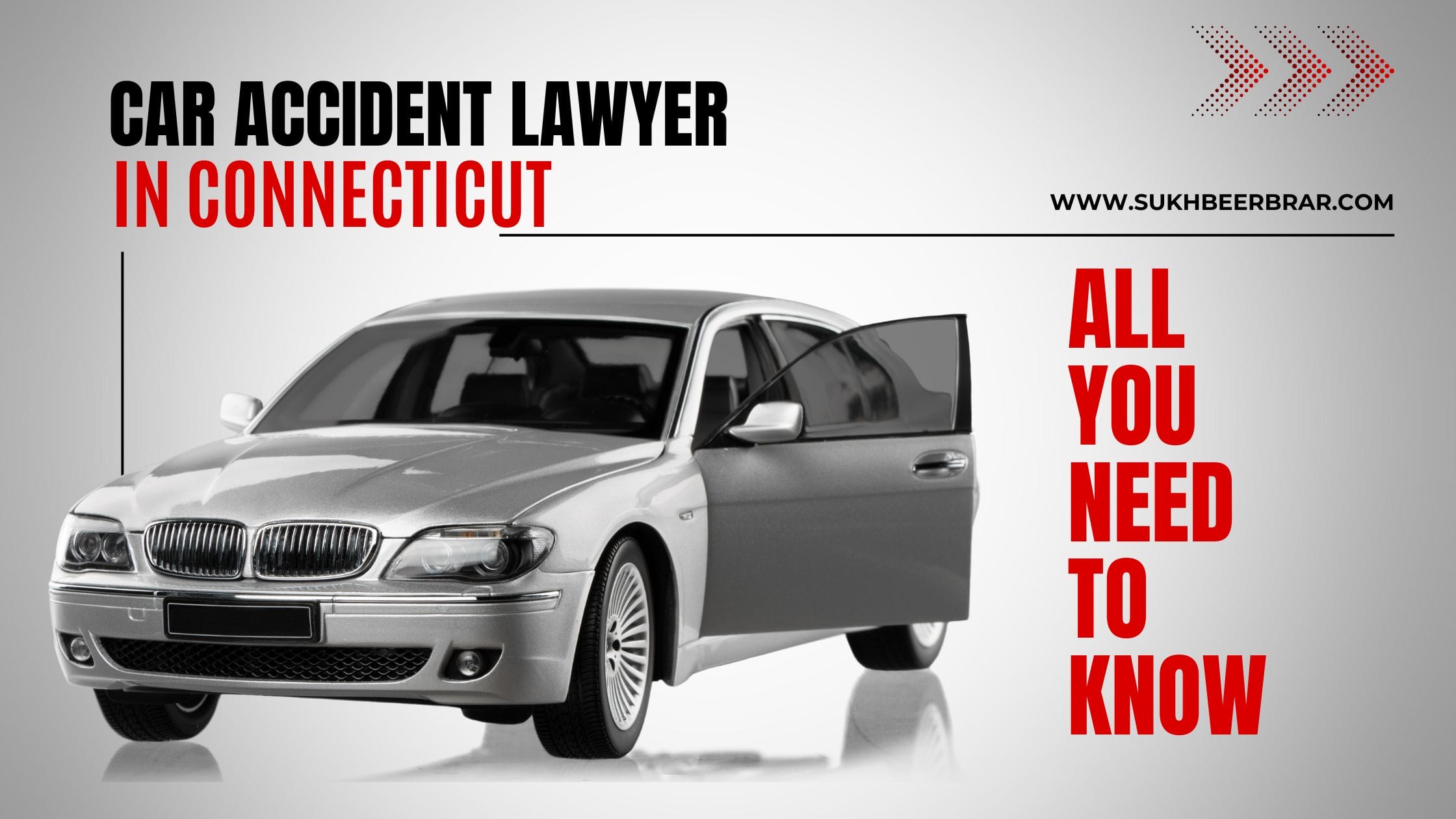If you’ve been involved in a car accident in Connecticut, you may be feeling overwhelmed and unsure of what to do next. The aftermath of a car accident can be a stressful and confusing time, but it’s important to remember that you have rights and options for seeking justice and compensation. That’s where a car accident lawyer in Connecticut comes in. With their expertise and experience, a car accident lawyer can help you navigate the legal process, protect your rights, and fight for the compensation you deserve.
In this blog, we’ll discuss the importance of seeking legal representation after a car accident in Connecticut and what you can expect during the claims process. If you’re ready to get the help you need, don’t hesitate to contact a car accident lawyer in Connecticut today.
When Do You Need A Car Accident Lawyer In Connecticut?
There are several situations in which it may be beneficial to seek the help of a car accident lawyer in Connecticut. Some of these include:
You have sustained serious injuries: If you have sustained serious injuries as a result of a car accident, it may be in your best interest to seek the help of a car accident lawyer. A lawyer can help you pursue compensation for medical expenses, lost wages, and other damages, and ensure that you are fairly compensated for your injuries.
The other driver was at fault: If the other driver was at fault for the car accident, you may be entitled to compensation for your damages. A car accident lawyer in Connecticut can help you build a strong case and negotiate with the other driver’s insurance company to get the compensation you deserve.
The insurance company is not offering a fair settlement: If you have filed a claim with your insurance company and are not satisfied with the settlement offer, a car accident lawyer can help you negotiate for a fair settlement. They can also represent you in court if necessary.
You are not sure of your legal rights: If you are unsure of your legal rights after a car accident, a car accident lawyer can help you understand your options and advise you on the best course of action.
You are not comfortable negotiating with the insurance company: If you are not comfortable negotiating with the insurance company on your own, a car accident lawyer in Connecticut can handle all communication and negotiations on your behalf. This can help to alleviate some of the stress and burden of the claims process.
Overall, if you have been involved in a car accident in Connecticut and are unsure of what to do next, it may be in your best interest to seek the help of a car accident lawyer in Connecticut. They can provide valuable legal guidance, protect your rights, and fight for the compensation you deserve.
Common Types Of Car Accident Cases
There are many different types of car accidents that can occur, and each type may have different legal implications. Some common types of car accident cases include:
- Rear-end collisions: These types of accidents occur when one vehicle hits the back of another vehicle. They are often caused by distracted or reckless driving, and may result in serious injuries to the driver and passengers of the front vehicle.
- T-bone collisions: Also known as side-impact collisions, these accidents occur when one vehicle hits the side of another vehicle. They can be especially dangerous due to the lack of protection on the sides of most vehicles.
- Head-on collisions: These accidents occur when two vehicles collide while traveling in opposite directions. They are often very serious and can result in serious injuries or fatalities.
- Single-vehicle accidents: These accidents involve only one vehicle and can be caused by a variety of factors, including poor road conditions, driver error, or vehicle malfunction.
- Pedestrian accidents: These accidents occur when a vehicle hits a pedestrian. They can be caused by distracted or reckless driving and may result in serious injuries or fatalities to the pedestrian.
- Hit-and-run accidents: These accidents involve one driver leaving the scene of an accident without providing contact information or rendering aid to the other driver or pedestrians. They are illegal and can result in criminal charges for the driver who fled the scene.
- Drunk driving accidents: These accidents involve a driver who is under the influence of alcohol or drugs. They can result in serious injuries or fatalities and may also result in criminal charges for the driver.
Damages Available In Connecticut Car Accidents
If you have been involved in a car accident in Connecticut and are seeking compensation for your damages, there are several types of damages that you may be entitled to. These include:
- Medical expenses: You may be entitled to compensation for any medical expenses that you incurred as a result of the car accident, including hospital bills, doctor’s visits, and prescription medications.
- Lost wages: If you missed work as a result of the car accident, you may be entitled to compensation for your lost wages. This may include both past and future lost wages, depending on the severity of your injuries.
- Property damage: If your vehicle was damaged in the car accident, you may be entitled to compensation for the repair or replacement of your vehicle.
- Pain and suffering: You may be entitled to compensation for the physical and emotional pain and suffering that you experienced as a result of the car accident.
- Loss of consortium: If the car accident has affected your relationship with your spouse or other family members, you may be entitled to compensation for the loss of consortium.
It’s important to note that the specific damages that you may be entitled to will depend on the circumstances of your case. A car accident lawyer in Connecticut can help you understand the damages that you may be able to recover and can fight for the compensation you deserve.
Must Read: GST Calculator Australia (Add & Subtract GST Formula)
Common Car Accident Injuries in Connecticut
Car accidents can result in a range of injuries, including minor bumps and bruises to more serious and life-threatening injuries. Some common injuries that may occur in car accidents in Connecticut include:
- Whiplash: This is a common injury that occurs when the head and neck are violently jerked back and forth, causing strain on the neck muscles and ligaments. Symptoms of whiplash may include neck pain and stiffness, headaches, and difficulty moving the neck.
- Fractures: Fractures, or broken bones, are a common injury in car accidents. They can occur in any part of the body and can range in severity from simple fractures that can be treated with a cast to more serious fractures that may require surgery.
- Soft tissue injuries: Soft tissue injuries, such as sprains, strains, and contusions, can occur when the body is subjected to sudden force, such as in a car accident. These injuries can cause pain, swelling, and difficulty moving the affected body part.
- Head injuries: Head injuries, such as concussions, can occur in car accidents when the head is subjected to a sudden impact. Symptoms of a concussion may include headache, dizziness, difficulty remembering things, and changes in behavior or personality.
- Spinal cord injuries: Spinal cord injuries can be serious and may result in permanent paralysis. They can occur when the spine is subjected to a sudden impact, such as in a car accident.
If you have been involved in a car accident in Connecticut, it is important to seek medical attention as soon as possible, even if you do not think you have been seriously injured. Some injuries, such as whiplash and concussion, may not manifest symptoms until days or even weeks after the accident. A medical professional can evaluate your injuries and provide appropriate treatment.
What Should You Do If You’re In A Car Accident?
If you are involved in a car accident, there are several steps you should take to protect yourself and others:
Check for injuries: Check yourself and any passengers for injuries. If anyone is injured, call for medical assistance immediately.
Call the police: If the accident involves serious injuries, significant property damage, or a hit-and-run, call the police. They will investigate the accident and file a report, which may be helpful in any insurance claims or legal proceedings that may follow.
Exchange information: Exchange information with the other driver, including names, contact information, insurance information, and vehicle registration. You should also get the names and contact information of any witnesses to the accident.
Take photos: Use your phone to take photos of the accident scene, including any damage to your vehicle and the other vehicle, and any visible injuries. These photos may be useful as evidence in any insurance or legal proceedings.
Report the accident: Notify your insurance company as soon as possible after the accident. You should also report the accident to the Department of Motor Vehicles if it meets certain criteria, such as if there were any injuries or deaths, or if the damages exceeded a certain amount.
Seek medical attention: If you or anyone else involved in the accident was injured, seek medical attention as soon as possible. Even if you do not think you were seriously injured, it is important to be evaluated by a medical professional to ensure that you receive any necessary treatment.
It is important to remain calm and collected after a car accident. Stay at the scene until the police arrive and cooperate with their investigation. Do not admit fault or apologize for the accident, as these statements may be used against you in any insurance or legal proceedings that may follow.
Don’t Fight With Insurance Companies By Yourself
Dealing with insurance companies can be stressful and time-consuming, especially if you are dealing with the aftermath of a car accident. It is important to keep in mind that insurance companies are businesses and may be more interested in protecting their own profits than in fairly compensating you for your losses.
If you are involved in a car accident, you should contact your insurance company as soon as possible to report the accident and begin the claims process. However, you should be aware that insurance adjusters may try to minimize the amount of money they pay out on a claim, and may use tactics such as offering a low settlement offer or denying your claim altogether.
If you are having trouble getting the insurance company to pay what you believe is a fair amount for your losses, you may want to consider hiring an attorney to represent you. An attorney with experience in car accident cases can help you navigate the claims process and negotiate with the insurance company on your behalf. An attorney can also help you understand your rights and options and can advise you on the best course of action to take.
In general, it is a good idea to consult with an attorney if you are involved in a car accident, especially if you are experiencing serious injuries or significant property damage. An attorney can provide valuable guidance and help ensure that you receive fair compensation for your losses.
Here are some reasons why it may be a good idea to hire a Car Accident Lawyer in Connecticut:
- Expertise: A car accident lawyer has experience and expertise in handling car accident cases and can provide valuable guidance on how to navigate the claims process and negotiate with the insurance company.
- Knowledge of the law: An attorney can advise you on your rights and options under the law and can help ensure that you receive fair compensation for your losses.
- Negotiation skills: Insurance companies may try to minimize the amount they pay out on a claim. An attorney can negotiate with the insurance company on your behalf and work to get you the best possible settlement.
- Time and stress: Dealing with an insurance company can be time-consuming and stressful. An attorney can handle the claims process for you, allowing you to focus on your recovery.
- Resources: An attorney has access to resources such as expert witnesses and other professionals who can help build a strong case on your behalf.
Overall, hiring a Car accident lawyer in Connecticut can help you get the best possible outcome in your car accident case and can provide valuable guidance and support throughout the process.
Tips for choosing the right car accident lawyer in Connecticut for your needs
If you are considering hiring a car accident lawyer in Connecticut, it is important to choose an attorney who is experienced and knowledgeable in handling car accident cases.
Here are some tips for choosing the right car accident lawyer in connecticut for your needs:
- Look for experience: Choose a lawyer who has experience handling car accident cases and is familiar with the laws and regulations in Connecticut.
- Check the attorney’s reputation: Look for an attorney with a good reputation in the community and among other attorneys. You can ask for recommendations from friends, family, or other legal professionals, or check online reviews and ratings.
- Consider the attorney’s communication style: Choose an attorney who is willing to listen to your concerns and who you feel comfortable communicating with. You should be able to ask questions and receive clear and concise answers.
- Review the attorney’s track record: Look for an attorney with a track record of success in handling car accident cases and securing fair settlements for clients.
- Consider the attorney’s fees: Choose an attorney who is transparent about their fees and who offers a payment structure that works for you.
It is a good idea to meet with a few different attorneys before making a decision. This will allow you to get a sense of the attorney’s style and personality and to ask any questions you may have.
Things You Should Know Before Hiring a Lawyer for Your Car Accident
- Determine whether you need a lawyer: In some cases, a car accident may be a straightforward matter that can be handled by your insurance company without the need for legal representation. However, if you have suffered significant injuries or damages, or if the other party is disputing liability, it may be advisable to hire a lawyer.
- Consider the lawyer’s experience and expertise: It is important to find a lawyer who has experience handling car accident cases and is familiar with the laws and procedures in your state. Look for a lawyer who has a track record of successful settlements or verdicts in cases similar to yours.
- Understand the lawyer’s fees and payment arrangement: Most personal injury lawyers work on a contingency basis, which means they will receive a percentage of any settlement or award. Be sure to ask about the lawyer’s fees upfront and get a written fee agreement.
- Gather all relevant documentation: In order to build a strong case, your lawyer will need access to as much information as possible about the accident, including police reports, medical records, and any witness statements. Be prepared to provide copies of these documents to your lawyer.
- Communicate openly with your lawyer: It is important to be open and honest with your lawyer about the details of the accident and your injuries. This will help your lawyer build the strongest case possible on your behalf.
- Follow your lawyer’s advice: Trust your lawyer’s judgment and follow their advice on how to handle your case. It is important to remember that your lawyer is working on your behalf and has your best interests in mind.
Common mistakes to avoid after a car accident in Connecticut
- Failing to seek medical attention: If you have been injured in a car accident, it is important to seek medical attention as soon as possible, even if you do not think your injuries are severe. Some injuries, such as head injuries or internal bleeding, may not be immediately apparent, and delaying treatment could have serious consequences.
- Not contacting the police: If you are involved in a car accident, it is important to call the police, even if the accident seems minor. The police will create a report that may be useful later on in any insurance or legal proceedings.
- Not exchanging information with the other driver: Be sure to exchange information with the other driver, including names, contact information, insurance information, and license plate numbers.
- Admitting fault: It is important to be careful about what you say after a car accident, as anything you say could be used against you later on. Do not admit fault or apologize for the accident, as this could be seen as an admission of guilt.
- Not taking pictures: If possible, take pictures of the accident scene, including the damage to your vehicle and the other driver’s vehicle. These pictures could be useful later on in any insurance or legal proceedings.
- Not contacting your insurance company: Be sure to notify your insurance company as soon as possible after a car accident. Your insurance company may be able to assist you with any damages or injuries resulting from the accident.
How Long Do You Have to File a Car Accident Claim in Connecticut?
In Connecticut, you generally have two years from the date of the car accident to file a claim for personal injury or property damage. This time limit, known as the statute of limitations, applies to both civil lawsuits and insurance claims. If you do not file your claim within this time frame, you may be barred from recovering damages.
It is important to keep in mind that the statute of limitations for car accident claims may vary depending on the circumstances of the case.
If you are unsure of the deadline for filing a car accident claim in Connecticut, it is advisable to speak with a lawyer. A lawyer can help you understand your rights and the deadlines that apply to your case.
How Do I Pay For A Car Accident Lawyer in Connecticut?
Most car accident lawyers in Connecticut work on a contingency basis, which means that they will not charge you any upfront fees for their services. Instead, they will take a percentage of any settlement or award that you receive. This arrangement allows you to seek legal representation without having to worry about paying for the lawyer’s services out of pocket.
The percentage that a lawyer will charge will depend on the specifics of your case and the lawyer’s experience and reputation. It is important to discuss the lawyer’s fees and payment arrangement upfront and get a written fee agreement to ensure that you understand the terms of the arrangement.
It is also worth noting that some lawyers may require you to pay certain expenses, such as court costs or expert witness fees, as the case progresses. These expenses are typically separate from the lawyer’s contingency fee and will be discussed with you in advance.
If you are unable to afford a lawyer, you may be able to seek assistance through a legal aid organization or pro bono program. These organizations provide legal representation to individuals who cannot afford it.



